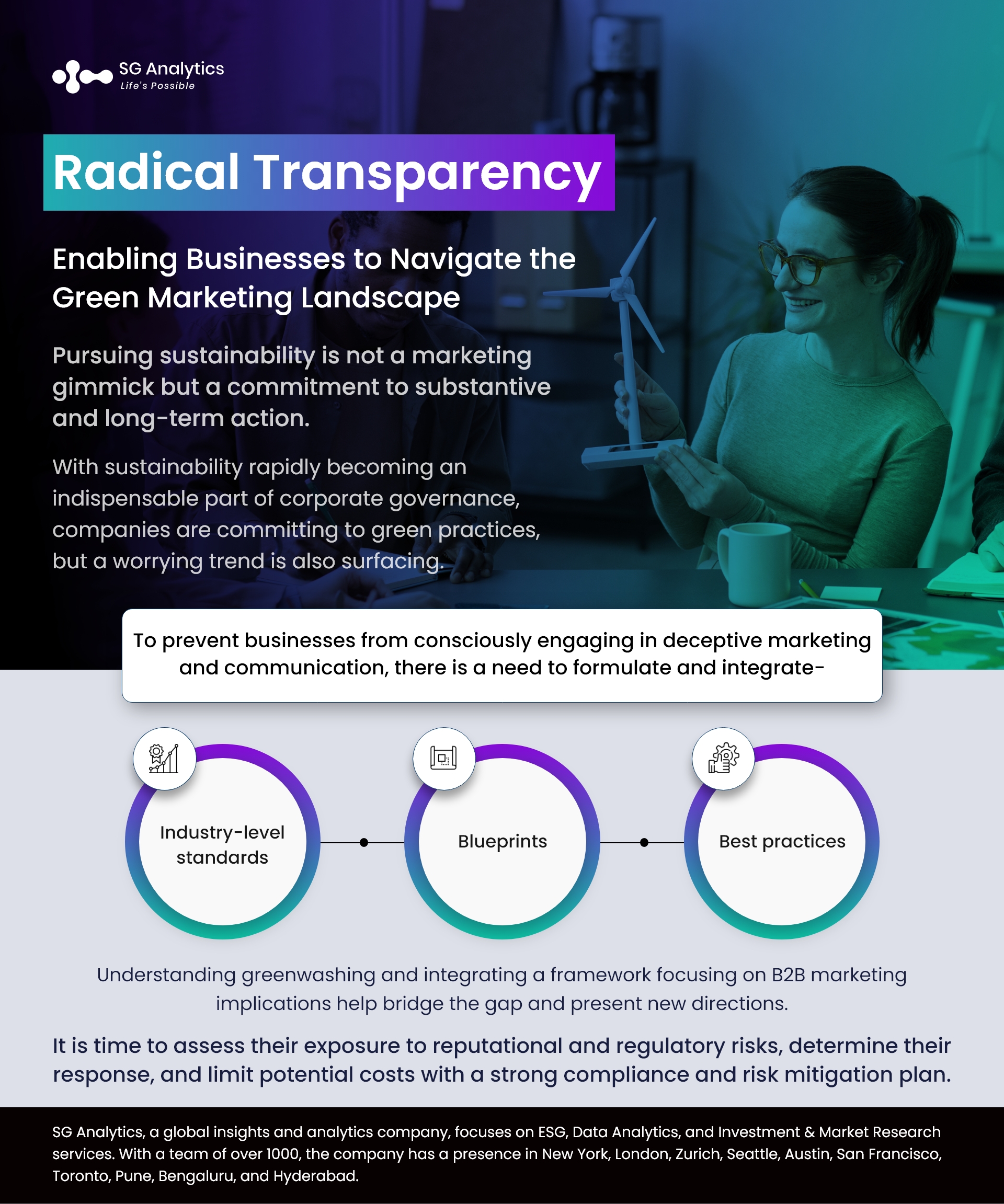The world is in a climate emergency, and the pressure to take more aggressive steps to prevent global warming is increasing. With sustainability concerns being a top priority for organizations, it is critical for them to engage in the topic the right way
Greenwashing is misleading audiences with inflated or false claims about environmental friendliness. The use of vague language or making irrelevant claims around sustainability are a few ways organizations can be called out for greenwashing. While it’s compelling to market the business in a positive light, faking ethical behavior is not the way to move forward.
Some corporations paint themselves green while failing to back their claims with concrete actions.
With sustainability rapidly becoming an indispensable part of corporate governance, companies are committing to green practices, but at the same time, a worrying trend is also surfacing.
Read more: Greenwashing 101: Understanding Different Types of Greenwashing
Tackling the Risks by Designing Green B2B Marketing Strategies
Companies need to evolve beyond reactionary tactics of responding to greenwashing accusations. They need to engage in a discussion with their stakeholders and establish practices to tackle new challenges.
Some greenwashing outcomes result from a conscious decision to mislead or engage in B2B marketing by making unsubstantiated claims. However, such claims can be made unintentionally—without awareness that a misleading message is being sent.
A dual framework can offer-
- prevention-detection-correction model for quality control operations
- helps create conditions to promote and incentivize substantive green action and proper communication.
Establishing a conventional approach to prevent intentional greenwashing can enable organizations to seek solutions by blending voluntary business insights with an institutional and regulatory approach. The formulation and integration of industry-level standards, blueprints, and best practices will prevent businesses from consciously engaging in deceptive marketing and communication.

To prevent unintentional greenwashing practices, organizations also need to build their capacities in the form of education and train their employees across various departments on the environmental component of the company's operations and their impact. This will enable teams to develop effective substantive green marketing strategies while preventing unintentional greenwashing.
Read more: A Simple Guide on How to Avoid Greenwashing Traps
Way to Mitigate Greenwashing Risks
Today, the domain of marketing hyperbole has also become a subject of regulatory review, imposing a higher risk to corporate controls and reputation. However, these risks can be mitigated by internally assessing the materiality of the organizational goals regarding climate, determining their relevance to the stakeholders, and establishing a regulatory compliance and communication strategy. This further involves:
- Understanding potential risks and addressing those risks can go a long way in navigating regulatory inquiries.
- Adopting compliance programs to address the new requirements can also be used to reduce potential exposure.
- Obtaining independent, third-party review and assurance further assists in solidifying regulatory risk mitigation.
- Responding to the pressures to adopt and implement sustainable practices helps create a competitive advantage.
Embracing ESG can remain a competitive advantage under a stricter regulatory regime if done properly. With the integration of new regulations, organizations will likely face new risks tied to greenwashing, greenhushing, and greenbashing.
Greenwashing
- Identifying public statements.
- Presenting supporting evidence to validate the organization's public statements.
- Establishing a process to manage public ESG statements and responses.
- Creating a centralized inventory to respond to requests for validation of ESG claims.
- Establishing a review and approval procedure for new claims.
Greenhushing
- Reviewing public ESG statements and activities previously made.
- Validating the accuracy and feasibility of historical statements related to current activities.
- Acknowledging prior goals that may have changed due to changing circumstances and/or reassessment and recognizing those changes publicly.
- Establish significant KPIs and other metrics to monitor and track the set goals.
- Reporting the KPIs, along with actions to be taken to better those metrics, in a regular report.

Greenbashing
- Establishing policies against attacking efforts or issuing public statements against ESG efforts.
- Managing government and regulatory measures to communicate challenges set for achieving green goals.
- Performing periodic communications regarding the company's ESG activities and benefits.
- Involving stakeholders to contribute to and help steer direction.
Read more: ESG Trends to Watch Out
Nurturing Transparency and Corporate Social Responsibility
Greenwashing benefits a corporation when it successfully deceives its customers. Overstating sustainability efforts can severely backfire if the gap between rhetoric and reality is exposed.
With transparency, they can bridge this gap between artificial and genuine concern for the environment. Leaders need to, therefore, ensure that public communications related to sustainability are accurately reflected in the group’s actual practices.
Engaging in CSR practices for companies operating in emerging markets can further help them gain a competitive edge. They should report on and rectify potential discrepancies in their sustainability actions and communications. Additionally, establishing comprehensive monitoring through external assurance can further help boost transparency and accountability, thereby reducing the chance of perceived greenwashing.
Regardless of the industry, addressing major social concerns such as environmental sustainability will help establish corporate citizenship as environmentally friendly and in tune with societal expectations. It is all about scalability. Green marketing practices are becoming increasingly effective in establishing an organization as a socially responsible and credible organization.
Read more: Navigating the Future of ESG Investments While Balancing Risk and Responsibility

Final Thoughts
Companies are facing vigilant environmental activism when developing B2B marketing strategies. There is a growing need to focus on identifying discrepancies in intended marketing messages and actual practices and an increasingly tightening regulatory environment.
The best way to avoid greenwashing accusations is to walk the walk. Embracing green marketing is not just about hopping on a trend but about showcasing the organization's commitment to creating a sustainable future by being transparent. With consumers increasingly favoring eco-conscious brands, investors are also considering ESG practices, and employees are seeking work opportunities at value-driven companies. Integrating sustainability into businesses can further help gain a competitive advantage.
Pursuing sustainability is not a marketing gimmick but a commitment to substantive and long-term action. The audience, the stakeholders, and the world are demanding substantive organizational setups that incorporate sustainable practices across their entire ecosystem to benefit through a sincere commitment to sustainable practices. By understanding greenwashing and integrating a framework that focuses on B2B marketing implications will help bridge the gaps in existing research on this phenomenon and present new directions.
For organizations making sustainability claims as part of their environmental, social, and governance (ESG) efforts, it is time to screen and clean their green claims. Formalized rules and regulations enable imposing regulatory scrutiny, penalties, and fines. It is time for firms to assess their exposure to reputational and regulatory risks, determine their response, and limit potential costs with a strong compliance and risk mitigation plan.
A leader in ESG Services, SG Analytics offers bespoke sustainability consulting services and research support for informed decision-making. Contact us today if you are in search of an efficient ESG (Environmental, Social, and Governance) integration and management solution provider to boost your sustainable performance.
About SG Analytics
SG Analytics (SGA) is an industry-leading global data solutions firm providing data-centric research and contextual analytics services to its clients, including Fortune 500 companies, across BFSI, Technology, Media & Entertainment, and Healthcare sectors. Established in 2007, SG Analytics is a Great Place to Work® (GPTW) certified company with a team of over 1200 employees and a presence across the U.S.A., the UK, Switzerland, Poland, and India.
Apart from being recognized by reputed firms such as Gartner, Everest Group, and ISG, SGA has been featured in the elite Deloitte Technology Fast 50 India 2023 and APAC 2024 High Growth Companies by the Financial Times & Statista.









